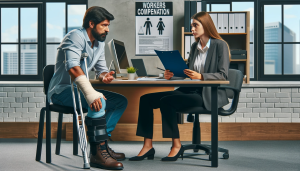Car accidents are an unfortunate reality of modern life, with millions occurring annually on roads worldwide. Despite advancements in vehicle safety, auto accident injuries remain a significant concern for drivers and passengers alike. Understanding the range of car crash trauma can be crucial for post-collision recovery and can help victims prepare for the road ahead. This comprehensive guide aims to shed light on the most common injuries sustained during traffic accidents and provide insights into their treatment and rehabilitation.


Whiplash: The Classic Car Crash Trauma
Whiplash is perhaps the most well-known injury associated with car accidents. It occurs when the head is suddenly jolted forward and then back, stretching the neck muscles and ligaments beyond their normal range. Symptoms, such as neck pain, stiffness, and headaches, can appear immediately or develop over time. Treatment typically involves pain management, physical therapy, and, in some cases, wearing a cervical collar. Understanding whiplash is a crucial step in post-collision recovery.Head-on Collision Impacts
Head-on collisions often result in severe auto accident injuries due to the high-speed impact and direct force involved. Victims may suffer from broken bones, spinal cord injuries, and even traumatic brain injuries (TBI). The road to recovery can be long and may involve multiple surgeries, extensive rehabilitation, and the potential for chronic pain post-accident.
Rear-End Collision Effects
In a rear-end collision, the sudden force can cause occupants to whip back and forth, leading to injuries similar to whiplash but also including lower back trauma. The severity can range from minor soft tissue damage to more serious spinal cord complications. It's not uncommon for symptoms to manifest days after the accident, making prompt medical attention essential.Side-Impact Crash Injuries
Side-impact crashes can be particularly dangerous due to the limited space between the occupant and the point of impact. Common car accident injuries in these scenarios include rib and pelvis fractures, internal organ damage, and head injuries. The proximity to the impact zone often results in more significant trauma compared to other types of collisions.The Dreaded Vehicle Rollover Trauma
Vehicle rollovers are violent and disorienting events that can lead to a range of injuries, from lacerations and broken bones to severe head and spinal injuries. The unpredictable nature of rollovers means that each case can present a unique set of challenges for emergency responders and medical professionals.Spinal Cord Injuries in Accidents
Spinal cord injuries are among the most devastating outcomes of car accidents. They can lead to partial or complete paralysis, significantly altering a person's lifestyle and independence. Accidents that cause damage to the spinal cord require immediate medical intervention and often result in long-term disability.Traumatic Brain Injury (TBI)
TBIs can occur due to the brain being shaken within the skull, leading to bruising, bleeding, or tissue damage. Symptoms can range from mild concussions to severe cognitive impairments. TBI treatment is complex and may involve neurologists, physical therapists, and cognitive rehabilitation specialists.Soft Tissue Damage and Broken Bones
Soft tissue injuries, such as sprains and strains, are common in car accidents and can cause significant discomfort and mobility issues. Broken bones in car accidents are also prevalent and can range from simple fractures to compound breaks requiring surgical intervention. Both types of injuries necessitate a proper diagnosis and a tailored treatment plan.
Internal Bleeding and Seat Belt Injuries
Internal bleeding from crashes is a silent threat that can be life-threatening if not detected early. Seat belt injuries, while less severe, can still cause bruising, abdominal injuries, and in some cases, fractures. These injuries underscore the importance of a thorough medical examination after any car accident.Psychological Effects of Car Accidents
The psychological effects of car accidents are often overshadowed by physical injuries but are equally important to address. Victims may experience anxiety, depression, or post-traumatic stress disorder (PTSD) following a traumatic event. Professional psychological support can be vital in helping individuals cope and recover mentally.Rehabilitation and Post-Collision Recovery
Rehabilitation after traffic accidents is a multidisciplinary effort involving physical therapy, occupational therapy, and sometimes speech and psychological therapy. The goal is to help victims regain as much function as possible and return to their daily lives. Personalized accident injury treatment plans are crucial for effective healing.Conclusion
Car accidents can have a profound impact on individuals' lives, causing a wide range of injuries and necessitating comprehensive care. By understanding the common injuries and their treatments, individuals can be better prepared to face the challenges of recovery. Always remember, safety first - drive responsibly and stay aware of the risks.Look for an attorney who has the right legal resources for your legal needs.
Contact us here on the Warmuth Law website or through our hotline 888-517-9888.











